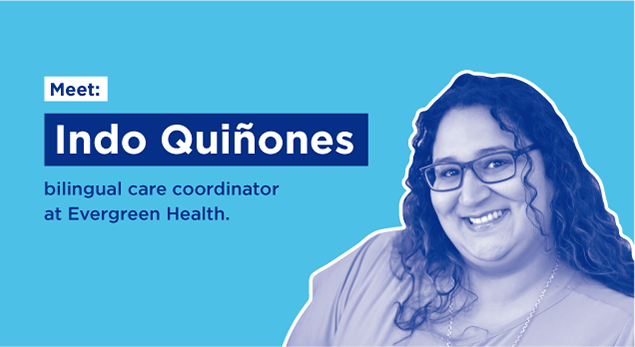Bilingual Care Coordinator Indo Quiñones Knows a Thing or Two About Cultural Competency
November 12, 2019

As a bilingual care coordinator at Evergreen, Indo Quiñones advocates for her patients in English and Spanish and works on all aspects of health, from routine care to housing. Indo knows that every mind and body is different and that people deserve to be understood for who they are. In our latest Team Evergreen interview, Indo chats about the judgment-free model at Evergreen and her work with cultural competency (while sharing some great insights in Spanish along the way!).
What’s your role at Evergreen?
I’ve been here a little over three years and I began as an outreach and engagement specialist. In that role, I worked to get potential patients into programs and services that would help them. We went door-to-door and set up tables at fairs and other places to provide information and talk to people in the community about Evergreen Health. Now, my title is bilingual care coordinator.
What does a care coordinator do?
A care coordinator helps patients facilitate their own physical, mental and social healthcare goals by meeting with them periodically. We see how they’re doing to check on any progress that has been made and guide them through any barriers that prevent them from accessing the care they need. We help by serving as advocates when needed or linking them to providers or specialists.
How does social health impact people?
Social health includes things like issues with housing. While we can’t do much about rent or finances, we will help people find links to subsidy programs, apply for Housing and Urban Development programs or apply for low-income housing. If someone needs access to nutritious food, we have a pantry at Evergreen or we can provide patients with a list of other local food pantries. If a patient is interested in vocational or educational training, we provide as much information as possible about starting classes or getting volunteer information. We’re here to do everything we possibly can.
How would you describe Evergreen using only one word?
Evergreen es el paciente. Evergreen is the patient.
As a bilingual care coordinator, you provide care in both Spanish and English. What do you want your patients to know about a visit to Evergreen? ¿Qué quiere usted que sus pacientes sepan sobre una visita a Evergreen?
Este lugar es solo una herramienta para ayudarlo a progresar en su salud y su vida, como paciente y como persona. No es una solución completa, pero vamos a trabajar juntos. No vamos a juzgarlo y solo vamos a trabajar como usted quiere—no solo por usted pero con usted.
Loosely translated, you said that Evergreen helps people improve their health and lives by working with them, not just for them.
How does Evergreen go about empowering people to make the best decisions for their healthcare?
Evergreen has a judgment-free, progressive way of healing people and treating patients. We accept every person regardless of creed, color, political stance or sexual orientation. No vamos a juzgarlo. We’re not going to judge you or your situation.
You studied international business and lived in Madrid for a while. What did that teach you, and how has that shaped your point of view?
I’ve learned that we can put up physical barriers and walls, but we are all people, and we’re all learning from each other. With technology and social media, we need each other more than ever. Some people believe in ethnocentricity, but that’s not how the world works anymore. We rely on other nationalities and countries to be who we are and live the way we live every day. We’re a globalized world, and we’re just going to get more globalized.
What’s something you learned during your career?
You don’t treat others the way you would like to be treated; you treat others the way they want to be treated. The way I treat one patient is different from the way I treat another, because they come from different backgrounds, and they’re at different places in their lives.
What did you do before joining Team Evergreen?
I worked at Chautauqua Tapestry as a cultural linguistic competency coordinator. The purpose of my role was to facilitate cultural competency training with other agencies and providers in the Chautauqua County area. That included advocating for bilingual staff to be available, more diversity training and a better understanding of what it means to be culturally competent.
What does it mean to be culturally competent? ¿Qué debemos saber?
Hemos progresado como una comunidad, pero también nosotros tenemos mucho trabajo por delante. Todavía hay personas y institutos que necesitan más educación en diversidad, en el aceptar de una persona y el entender que el mundo no es blanco y negro. Nosotros somos todos diferentes. Hay variedades de personas y mentes en el mundo, y cada mente es un mundo.
“Cada mente es un mundo.” How does that translate?
Every mind is a world. We’ve progressed as a community, but there’s still a lot of work ahead of us. There are still people and institutions that need more education in diversity, in accepting people and understanding that the world isn’t black and white. We are all different. There are a variety of people and minds in the world, and every mind is its own world.
What is something you’re proud of?
I am proud of the work I do at Evergreen, the work I did in my previous role and the work I do outside of business hours. I am also proud of not being a statistic as a woman of color in a very conservative area. There’s pride in showing the world that I’m trying to be a good person.
We are proud to have a dedicated team member like you, Indo. Thanks for sharing your story!